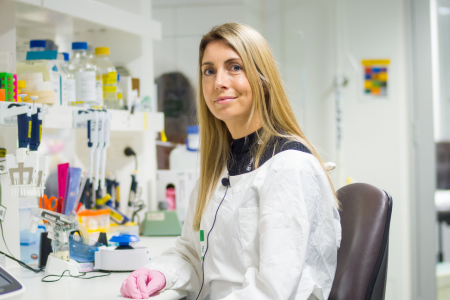Sarcoma Awareness Month: Our impact, our projects and our focus for the future

As part of Sarcoma Awareness Month, we’ve shone a light on several past projects we’ve funded in a bid to find more effective, less harmful treatments for kids with sarcoma.
In this article, we’re going to give you an idea of the research we’re currently funding, as well as some updates on those particular projects.
Three sarcoma projects are currently receiving funding from The Kids’ Cancer Project as part of its 2024 funding round, which will continue throughout 2025/26.

Associate Professor Fernando Guimaraes and Associate Professor Wayne Nicholls from the University of Queensland are currently investigating the use of Natural Killer cells to treat sarcoma. The study is ongoing, with results likely to be released next year.
Two Col Reynolds Fellows also have dedicated their studies to sarcoma research. Dr Emmy Fleuren, is determined to utilise cutting-edge technologies like phosphoproteomics to uncover new targets within sarcoma cells for drugs to target.
Heading up the only Australian lab dedicated to childhood sarcoma research at The Children’s Cancer Institute, Dr Fleuren aims to bring innovative, lab-developed discoveries into the clinic, ensuring kids with sarcoma will finally benefit from targeted therapies tailored to their unique needs.
A monthly donation to The Kids’ Cancer Project allows you to build long-term impact for kids with cancer.
When you commit to survival with a monthly gift of just $15, you will ensure we can continue to fund bold clinical trials for sarcoma.
Sign up today.
The other sarcoma-studying Col Reynolds Fellow, The Children’s Medical Research Institute’s Dr Noa Lamm-Shalem, is investigating how to inhibit the AKT gene from interfering with cancer treatments, which often makes chemotherapy and radiation less effective.
If successful, Dr Lamm-Shalem will have ensured cancer cells are more responsive to therapy – helping to significantly improve survival rates.
Tragically losing her mother and grandmother to breast cancer, Dr Lamm-Shalem's motivation for research is clear, but her decision to particularly focus on sarcoma was due to the devastating effects the insidious disease can have on young lives, especially when treatment resistance builds up in the body.
She believes the importance of commemorative periods like Sarcoma Awareness Month are essential for raising public awareness, honouring those affected, and driving momentum for research.
“Sarcoma Awareness Month plays a crucial role in bringing much-needed visibility to a rare and often overlooked group of cancers,” she says.
“These moments are essential, not just for patients and families to feel seen and supported, but also for driving community engagement, funding, and scientific interest. Awareness leads to advocacy, and advocacy leads to investment in research, early detection, and better treatment options.
“For researchers like me, it’s an opportunity to connect with the public, share what we’re working on, and underscore the urgent need for breakthroughs in these difficult-to-treat cancers.
Dr Lamm-Shalem says her project is progressing well, already uncovering insights into how the nuclear F-actin within the nucleus of a sarcoma cell and AKT activation work together to resist chemotherapy, in which promyelocytic leukaemia (PML) nuclear bodies play a crucial role.
She says these results are promising for not only osteosarcoma patients, but other sufferers of AKT-driven childhood cancers such as neuroblastoma, acute lymphoblastic leukaemia and high-grade gliomas.
With an eye on the future, Noa is intent on inhibiting the work of AKT in developing tumours. Collaboration with industry partners will assist in developing therapies that could one day become clinical standards, with Noa currently expanding her team’s lab capabilities that could ensure results come quicker than currently anticipated.
“To every donor supporting The Kids’ Cancer Project and sarcoma research, thank you.
“You’re not just funding a lab – you’re fuelling hope for kids and families who desperately need better answers.
“Your generosity makes our work possible. Your support allows us to ask bold questions, pursue high-risk, high-reward ideas, and develop therapies that could transform the outlook for children facing cancer.
“Research is a long journey, but with your help, we're making strides every day."
A monthly donation to The Kids’ Cancer Project allows you to build long-term impact for kids with cancer.
When you commit to survival with a monthly gift of just $15, you will ensure we can continue to fund bold clinical trials for sarcoma.
Sign up today.

